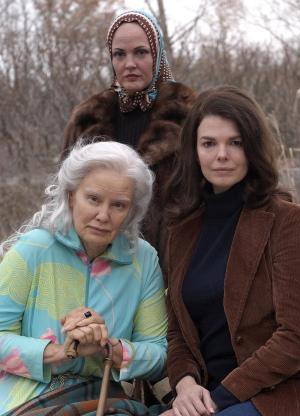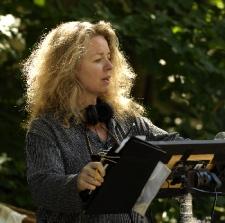
GREY GARDENS CAST. From left to right: Jessica Lange, Drew Barrymore and Jeanne Tripplehorn. Credit: Peter Stranks/HBO
When it premiered in 1975, the documentary Grey Gardens immediately set off a storm of controversy. Created by the fraternal directing team of David and Albert Maysles, the feature profiled a mother and daughter, 80-something Big Edie and 50-something Little Edie, who were the aunt and cousin of Jacqueline Kennedy Onassis. The two women had become notorious in their wealthy Long Island neighbourhood, because the mansion they lived in, Grey Gardens, was collapsing into ruin. Big Edie and Little Edie had once been wealthy, erudite aristocrats, and were now living in squalor, in a racoon- and cat-infested house that the local authorities were trying to have condemned.
While some accused the Maysles brothers of exploitation, Grey Gardens quickly gained a cult following among gay men, who saw in the damaged-but-resilient Little Edie a character of strength and defiance. Some pointed to the eerie parallels to the work of Tennessee Williams or Eugene O’Neill, or even Sunset Boulevard, that the film evoked.
Grey Gardens has inspired a veritable cottage industry of spin-offs, with its cult status largely going mainstream. In 2006, several gay men created a stage musical based on the film and its two central characters, which would win several Tony Awards (including best play). Queer crooner Rufus Wainwright wrote a song inspired by the film. And in April, HBO broadcast its made-for-TV movie, directed by gay filmmaker Michael Sucsy and written by Sucsy and Toronto-based lesbian filmmaker Patricia Rozema. The film leaps between the ’30s, when Little Edie was a gorgeous young debutante, and the ’70s, when the two women are invited by the Maysles to be in their film. The performances are exquisite in their mimicry, with Drew Barrymore playing Little Edie and Jessica Lange playing Big Edie. Rozema, of course, is one of Canada’s most successful independent filmmakers, having made two landmark lesbian films, I’ve Heard the Mermaids Singing and When Night Is Falling, both of which were international hits.
Rozema spoke to Xtra.ca about Grey Gardens from her home in Toronto, just as the film came out on DVD and the news arrived that it had received 17 Emmy nominations, including a nod to Rozema and Sucsy for their screenplay.
Xtra.ca: Do you remember the first time you saw the original Grey Gardens?
Patricia Rozema: Very clearly. I was in the Rivoli [a Toronto repertory cinema]. I was new enough in Toronto that I didn’t have a lot of friends. I was working at [CBC news program] The Journal. I was startled. I felt like I’d seen something dangerous. Too unkind to Little Edie, it felt. She was revealing herself to be quite a lost soul, and we were taking delight in it. But she did take delight and that’s what’s so mesmerizing about it. She wants us to look at her. That conflict was really exciting. At the time I was a journalist. So it raised the question: do you let people self-exploit?
Xtra.ca: So the question of exploitation was paramount from the get-go.
Rozema: Oh yes, but also affection for these people. A little bit of fear too. Could it really get there? Could I not care enough to let it get to that? They closed off rooms so they wouldn’t have to clean as much. They both hated cleaning. A real couple of slobs!
Xtra.ca: How was it that you got involved with the HBO movie version?
Rozema: Julie Goldstein was my main contact at Miramax for several years. We had a great experience on Mansfield Park [a Jane Austen adaptation that Rozema wrote and directed]. She and I work well together, so she asked me if I’d write it.
Xtra.ca: You did extensive research into the lives of these women.
Rozema: Actually, Michael [Sucsy] did a great deal of it. He found a box of letters by the women, learned that Little Edie had had this boyfriend, who was secretary of the interior at one point. He had done masses of research — he met with their relatives, people they’d stayed with, met with an old lady who’d stayed with them. He had a wealth of information. He had a linear script that would have cost them a lot. That’s what I received. I liked the idea of going back and forth in time, and also incorporating the story of the documentary itself, because that’s a key moment in their lives. We came up with this idea of two timelines. It’s a new idea in a sense — a new formal idea — to take documentary footage and recreate it precisely, and then have a speculative script about the characters’ background.
Xtra.ca: What was one of the main revelations you had about the two women?
Rozema: As mad as they are, I can see completely how you would find yourself in Little Edie’s shoes. It’s a perfect storm of circumstances: early feminism, entitled laziness, an attitude towards the arts that they were low, the Depression, a prissy husband who just wanted a trophy wife. The husband was spectacularly pompous; I’m glad he was presented sympathetically in the film, because they were a handful for him. Another weird thing was that Big Edie had a son who lived very close by but didn’t seem to be too involved in their lives. It was a family feud, because some in the family suggested that they should be cut off so they’d be forced to leave Grey Gardens, while others thought they should keep getting money.
Xtra.ca: Did you see the musical?
Rozema: I did, but I made sure I did after I’d finished the screenplay. I had heard there were some inaccuracies in it and I wanted to stick to the facts as much as I could.
Xtra.ca: It was your idea to incorporate the Maysles as characters in the film.
Rozema: Yes. To me it seemed really exciting and a pivotal part of the story. I love how switching points of view can change your experience of things, how it can change your morality even. I wanted to show scenes from the documentary itself, with deep mimicking and then contrast that with speculation about Little Edie yearning to be in New York. And to make out of that something coherent, and to make it not just about those two people but about all of us, struggling with questions about parents. Do we take care of them? Can you give up your life for someone else in your family? Is that what’s required of us? I think everybody struggles with that. Even for the very wealthy, how much do you commit yourself to taking care of your parents?
Xtra.ca: Okay, so I have to ask the $64,000 question: why does Grey Gardens have so many gay fans?
Rozema: That was news to me. I had no idea when I saw it. This is one of those cases where we should separate gay men and lesbians. It’s a gay following, mainly. It’s an extreme, daring film. These are fabulous outsiders who understand their own private culture. That’s a point of identification. The Edies have a combination of brazen, non-apologetic, fuck-you attitude, but there’s also sympathy there. They are refined and cultured but live in less-than-perfect circumstances. There’s a tragic element too.
Xtra.ca: Many people argue that independent cinema is in real trouble right now. You’re one of the most successful independent filmmakers Canada’s ever had. What’s your prognosis?
Rozema: It isn’t in trouble really. People will be making independent stories and getting them out somehow. The question is how. The means of making stories has never been easier to get. The possibility of communicating has never been greater. But how do you make money on it? It’s really interesting to me. Maybe artists, writers, filmmakers, will never make very much money anymore. Perhaps it was a blip in history how some could suddenly become millionaires because we liked their smile or the way they turned a phrase or sang a song. I guess the bright side would be, only the real artists would continue to work in that world. You’d have to be committed, and for the right reasons.

 Why you can trust Xtra
Why you can trust Xtra


